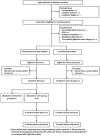Behavioural sleep problems in children with attention-deficit/hyperactivity disorder (ADHD): protocol for a prospective cohort study
- PMID: 24523423
- PMCID: PMC3927707
- DOI: 10.1136/bmjopen-2013-004070
Behavioural sleep problems in children with attention-deficit/hyperactivity disorder (ADHD): protocol for a prospective cohort study
Abstract
Introduction: Children with attention-deficit/hyperactivity disorder (ADHD) commonly experience behavioural sleep problems, yet these difficulties are not routinely assessed and managed in this group. Presenting with similar symptoms to ADHD itself, sleep problems are complex in children with ADHD and their aetiology is likely to be multifactorial. Common internalising and externalising comorbidities have been associated with sleep problems in children with ADHD; however, this relationship is yet to be fully elucidated. Furthermore, limited longitudinal data exist on sleep problems in children with ADHD, thus their persistence and impact remain unknown. In a diverse sample of children with ADHD, this study aims to: (1) quantify the relationship between sleep problems and internalising and externalising comorbidities; (2) examine sleep problem trajectories and risk factors; and (3) examine the longitudinal associations between sleep problems and child and family functioning over a 12-month period.
Methods and analysis: A prospective cohort study of 400 children with ADHD (150 with no/mild sleep problems, 250 with moderate/severe sleep problems) recruited from paediatric practices across Victoria, Australia. The children's parents and teacher provide data at baseline and 6-month and 12-month post enrolment.
Key measures: Parent report of child's sleep problem severity (no, mild, moderate, severe); specific sleep domain scores assessed using the Child Sleep Habits Questionnaire; internalising and externalising comorbidities assessed by the Anxiety Disorders Interview Schedule for Children IV/Parent version.
Analyses: Multiple variable logistic and linear regression models examining the associations between key measures, adjusted for confounders identified a priori.
Ethics and dissemination: Ethics approval has been granted. Findings will contribute to our understanding of behavioural sleep problems in children with ADHD. Clinically, they could improve the assessment and management of sleep problems in this group. We will seek to publish in leading paediatric journals, present at conferences and inform Australian paediatricians through the Australian Paediatric Research Network.
Keywords: Sleep Medicine.
References
-
- Barkley RA. Attention-deficit hyperactivity disorder. A handbook for diagnosis and treatment. 3rd edn New York: Guilford Press, 2006
-
- Polanczyk G, de Lima MS, Horta BL, et al. The worldwide prevalence of ADHD: a systematic review and metaregression analysis. Am J Psychiatry 2007;164:942–8 - PubMed
-
- Mindell JA, Owens JA. A clinical guide to pediatric sleep: diagnosis and management of sleep problems. 2nd edn Philadelphia, PA: Lippincott Williams and Wilkins, 2010
-
- Cortese S, Faraone SV, Konofal E, et al. Sleep in children with attention-deficit/hyperactivity disorder: meta-analysis of subjective and objective studies. J Am Acad Child Adolesc Psychiatry 2009;48:894–908 - PubMed
-
- Owens JA, Maxim R, Nobile C, et al. Parental and self-report of sleep in children with attention-deficit/hyperactivity disorder. Arch Pediatr Adolesc Med 2000;154:549–55 - PubMed
Publication types
MeSH terms
LinkOut - more resources
Full Text Sources
Other Literature Sources
Medical

